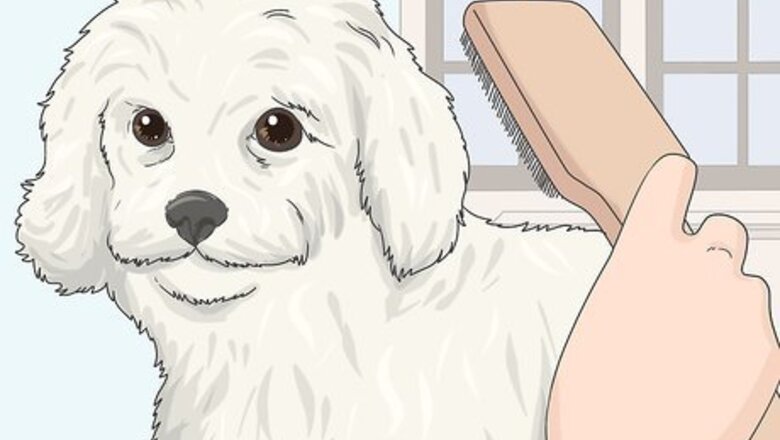
views
Brushing Your Maltipoo
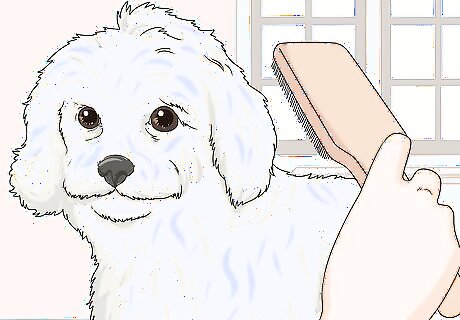
Brush a poodle-like coat every other day with a slicker brush. Maltipoo coats can be either more thin, fine, and poodle-like, or more thick, coarse, and maltese-like. If your pup has a poodle-like coat, use a slicker brush and aim to groom the coat at least every other day. Brush your dog when it’s calm and content, such as after a nice walk. Consider brushing the dog at the same time every day to create a routine. You can pick up a slicker brush at any pet supply retailer.
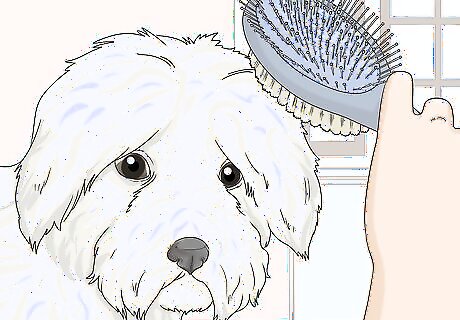
Brush a maltese-like coat daily with a pin-and-bristle brush. Thick, coarse fur requires more frequent brushing and a more heavy-duty brush. Grab a pin-and-bristle brush for the job, and groom a maltese-like coat at least once per day. You can use either the pin side or the bristle side of the brush, depending on which you find more effective. The thicker and curlier your maltipoo’s coat is, the more susceptible it is to developing tangles and mats. Frequent brushing is critical to preventing these. Like slicker brushes, pin-and-bristle brushes are available at any pet supply store.
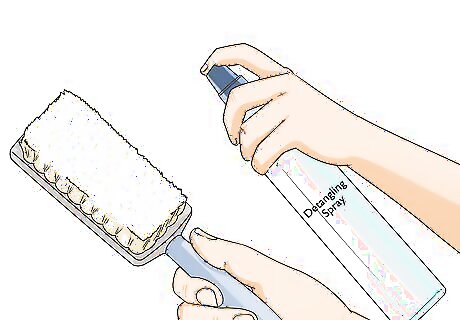
Apply detangler spray to your brush instead of the dog. Choose a detangler spray intended for dogs. Since it’s easy to over-saturate a maltipoo’s coat with the spray, try spraying your brush instead. Re-spray the brush every few minutes as needed. If the fur gets over-saturated with detangler spray, it’s actually more likely to get tangled up in the brush and potentially yanked out.
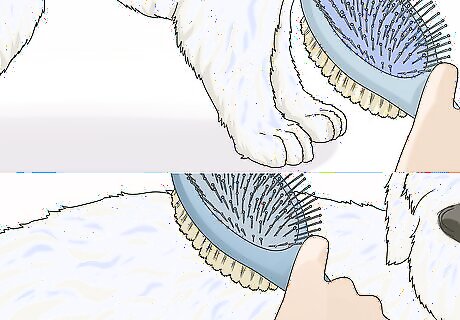
Begin brushing at the feet and work your way upward and back. Break up your maltipoo’s coat into sections and deal with them on at a time, ideally in the same order each time you brush. The feet are a good place to start, and you might follow up in this order: legs, face, hindquarters, tail, back, sides, belly, sanitary area (around the genitals). If you follow the same pattern each time, your dog will get used to the routine more quickly. Also, if you have to stop in the middle—for instance, if the dog gets fussy or if you have to take a call—it’s easy to pick right up where you left off.
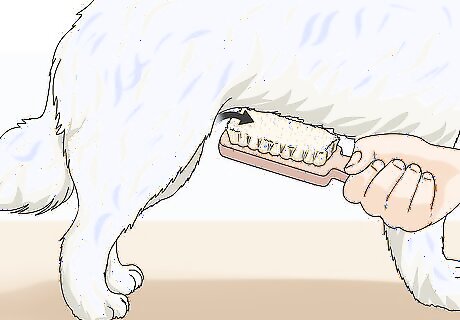
Brush from the skin outward using short, quick, firm strokes. Maltipoos don’t have an undercoat, so you can brush out each section of fur from root to tip. Use a quick repetitive motion to draw your brush through the same tuft of fur 3-4 times, then move on to an adjacent tuft. Remain calm and cheerful as you work, and offer frequent praise to your dog. Your maltipoo will notice!
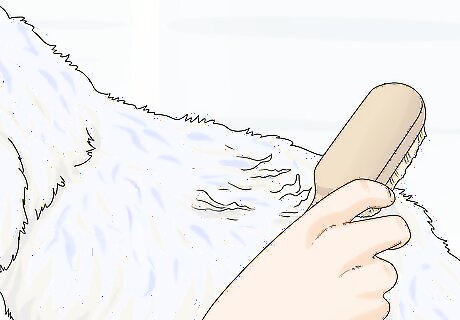
Work out tangles gently with your brush. Whenever your brush catches a tangle or mat, don’t try to just yank the brush through it. Instead, grasp the tuft of fur between the tangle and the skin with your free hand, then slowly work your brush through the tangle. If you can’t work out a particular tangle with your brush, move on to using a comb to work on it.
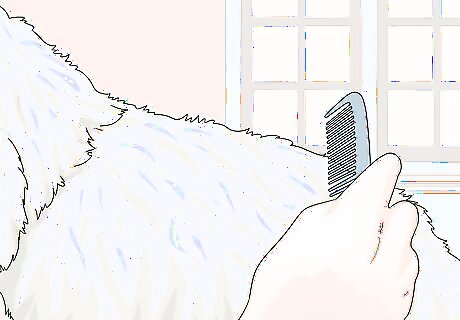
Repeat the process with a comb to find hidden mats or tangles. Try a stainless steel dog comb with wider teeth at one end and narrower teeth at the other—it’ll give you more control and options. Follow the same section-by-section grooming pattern as you did with the brush. The comb may snag tangles or mats that the brush missed. Try to work through them with the comb in the same fashion as the brush. If all else fails, use grooming shears to snip away the tangle or mat.
Bathing and Caring for Eyes, Ears, Teeth, and Nails
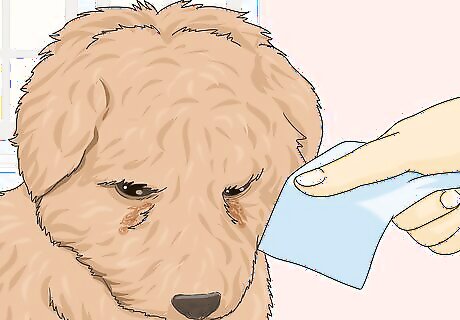
Prevent tear stains by cleaning under your pup's eyes twice per day. Maltipoos are very susceptible to developing dark tear stains under their eyes. Prevention is the best tactic, so try wiping a damp cloth under your dog's eyes twice per day. Some maltipoo owners recommend using a cloth dampened with diluted hydrogen peroxide, commercial tear stain removers, or other products. Talk to your vet before trying these options. Likewise, ask your vet for advice if your pup already has tear stains. In some cases, your vet may also recommend giving your dog eye drops and/or changing their diet in order to reduce tear staining.
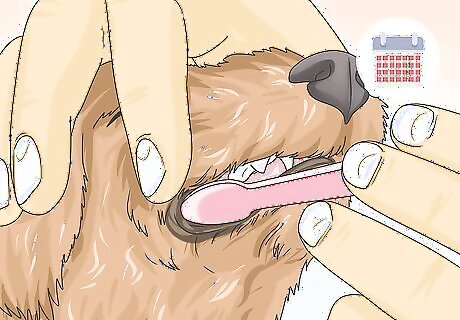
Brush your maltipoo’s teeth every day. Pick out a small dog toothbrush and a doggie toothpaste in a flavor your pup enjoys. Let your dog lick some of the tasty toothpaste off the brush at first, then brush its teeth as best you can. Brush in small circles and lift the dog’s lips to access the rear teeth. Human toothpaste may make your dog sick, and it will hate the flavor anyway! Ask your vet about offering your maltipoo dental treats on a regular basis. This is no substitute for brushing, though.
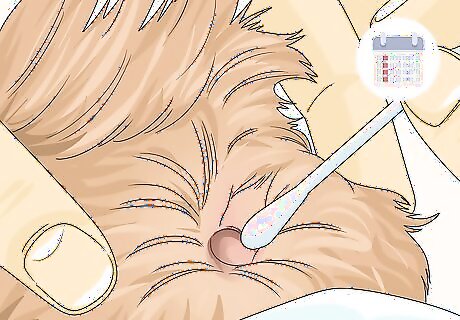
Clean your Maltipoo’s ears about once per week. Check inside each ear for wax buildup, discharge, or foul odors. Lightly dampen a piece of cotton gauze, wrap it around your finger, and gently swirl it around in the dog’s ear. Do not stick your finger deep into the ear. If there’s a great deal of buildup that you can’t reach or a particularly foul odor emanating from the ears, contact your vet.
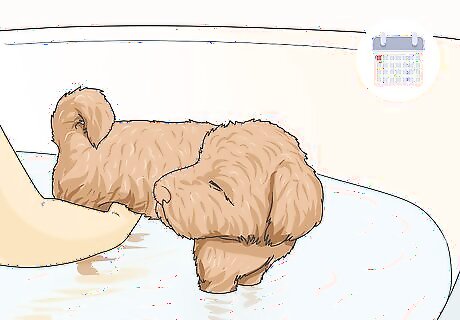
Bathe your maltipoo about once per month. Fill a sink about halfway with warm water, then gently place your maltipoo in its bath. Massage the water gently into its coat, then massage in a dog shampoo. Rinse this away with clean water, then repeat the process with a dog conditioner. Don’t wet wash the dog’s face this way. Instead, use a clean cloth and just the warm water. Wrap the dog in a warm towel as soon as you take it out of the bath, but don’t rub it with the towel—you’ll create tangles. Choose a time when your dog is calm and content. Offer lots of praise as you work. Don’t bathe your maltipoo more frequently than this unless absolutely necessary. Otherwise, you’ll strip the natural oils from its coat.
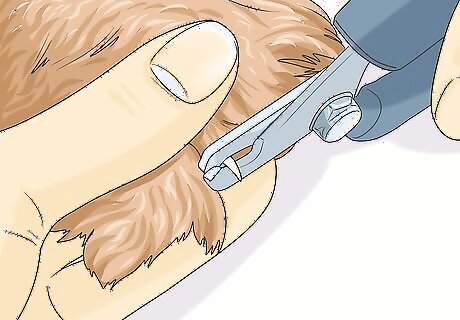
Clip your maltipoo’s nails after its monthly bath. Depending on your preference, use either a guillotine-style clipper or a nail grinder. In either case, remove very small amounts at a time so you don’t nick the quick, which is a sensitive blood vessel found in each nail. If possible, have a professional groomer show you how to trim nails properly. Use styptic powder or a styptic stick to stop any bleeding if you do hit the quick.
Doing a Simple Haircut
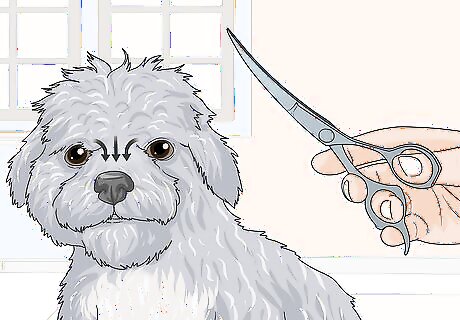
Use curved shears and a trimmer to clip between the eyes. Carefully snip any longer hairs near the inside corners of the eyes. Then, set the precision trimmer to its highest length setting and trim the area between the eyes. This is a good place to start if the dog is calm—you'll improve its ability to see, which may keep it calm during the haircut. If your pup isn’t calm, save this delicate work for later. For the best results, take your maltipoo to a professional groomer a few times before trying to do the job yourself. Watch closely, ask questions, and get cutting tips and tricks. The straightforward maltipoo cut described here is often just called the “pet cut.”
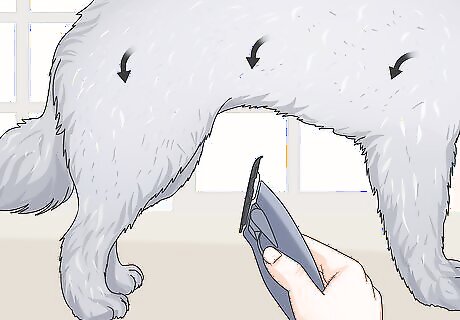
Trim the body with guarded clippers set to your preferred length. Snap the length-appropriate guard over the head of the clippers, then glide the clippers through the dog’s coat by skimming the guard over the dog’s skin. If your maltipoo has thicker, coarser, more maltese-like hair, cut against the grain (the direction of hair growth). It it has a thinner, finer, more poodle-like coat, go with the grain. For a warm weather coat, try a guard length of 0.625 in (1.59 cm). For a cool weather coat, try 0.5 in (1.3 cm). Start at the spine and work your way down one side of the dog. Then, do the other side, followed by the legs, feet, hindquarters, and tail.
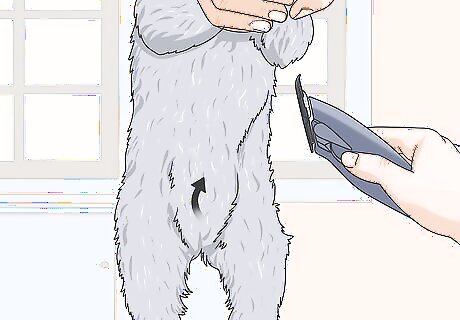
Work on the belly and sanitary area with the trimmer and curved shears. Grasp both front paws with one hand and lift your maltipoo so it’s standing on its hind legs. Use the precision trimmer, set to its maximum length, to trim down the hair on the belly and around the sanitary area (the genitals). Use the curved shears as needed to finish this delicate work. This is an extremely sensitive area for any dog, so work slowly and very carefully. If the dog is getting anxious or agitated, take a break and work on a different area for a while. If you’re not fully confident in your ability to work in this delicate area, take your dog to a professional groomer.
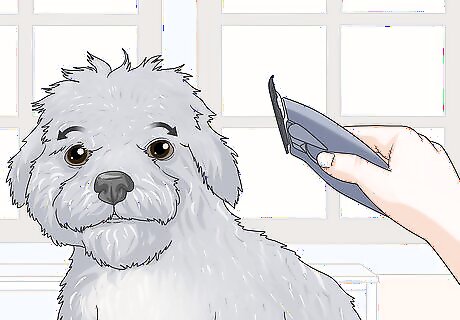
Create a visor over the eyes by brushing forward and trimming carefully. Use your preferred grooming brush or comb to bring the hair on top of the dog’s head forward and over its eyes. Then, use the curved shears to snip a slightly-arched “visor” over the eyes. Snip off small amounts at a time. You can always take more off, but you can’t put it back on! Work very carefully around the eyes. Use soothing words and calm body language as you work, and take a break if the dog gets upset.
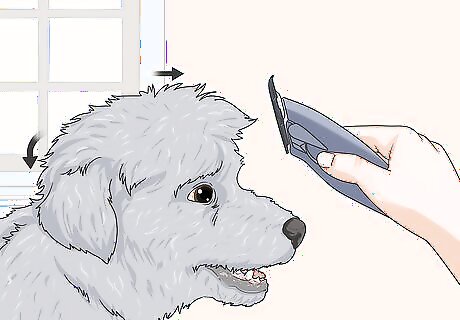
Blend the top of the head into the back of the neck with clippers. Once you’ve created the visor in front, use the clippers with your selected guard size to trim down the tuft of hair on top of the dog’s head. For simplicity’s sake, make it the same length as the hair on the back of the dog’s neck as well as its body. More complicated maltipoo hairstyles may involve keeping the hair on top of the head longer, but save those styles for when you have more grooming experience.
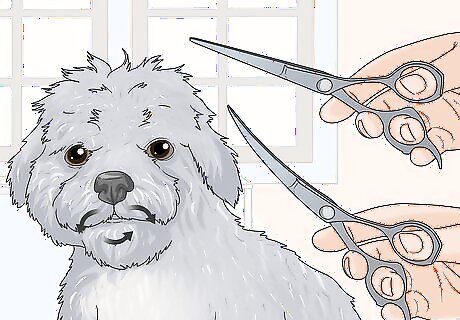
Cut around the mouth and nose with straight and/or curved shears. This is another very delicate area, so use whichever shears help you to safely access any long hairs near the mouth and nose. Aim to make the hair in the muzzle area slightly shorter than the dog’s body coat. Maltipoos like to stick their tongues out, so keep a close eye on the dog’s mouth while snipping away with your shears!
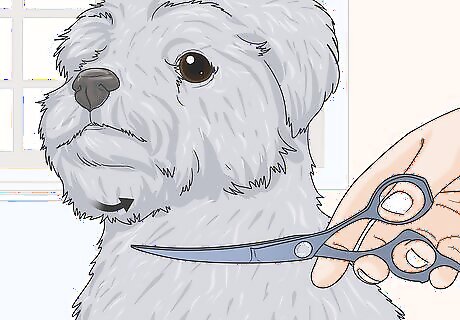
Round off the chin, sides of the face, and ears with curved shears. Start under the chin and use the curve of the scissors to your advantage as you trim. Shape the hair in this rounded pattern until you reach the base of the ears. Then, work around the perimeter of each ear, snipping off the hairs to give the ears a rounder look. Make sure not to snip into the flesh of the dog’s ear as you work. Shaping facial fur with scissors takes some practice. Don’t be discouraged if your first effort doesn’t turn out as well as you planned. Remember, the hair will grow back quickly and you’ll get another shot!
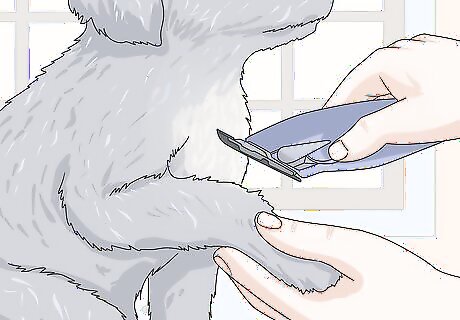
Trim around the paws and anus with your shears. Maltipoo groomers often keep the dog’s nails concealed under rounded tufts of fur at the feet. Use the curved shears to create this look. Also, for sanitary reasons, use your curved and/or straight shears to trim the hair surrounding the dog’s anus very short. If you don’t trim around the anus, the dog will end up with clumps of fecal matter matted in its coat.




















Comments
0 comment